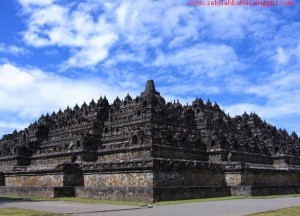Contoh Descriptive Text Tentang Tempat Bersejarah “Candi Borobudur”
Contoh Descriptive Text Candi Borobudur Beserta Artinya – Sahabat SBI yang baik hatinya kali ini mimin memberikan contoh descriptive text tentang Candi Borobudur. Check This Out!
Contoh Deskriptif Text Candi Borobudur
Borobudur is the largest temple in Indonesia. Candi Borobudur is located in Magelang, Central Java, in addition to being a bustling tourist attraction, is also a center of worship for Buddhists in Indonesia, especially in every celebration of Vesak. This is consistent with the meaning of its name is “monastery in the hills”. Borobudur is currently designated as one of the UNESCO World Heritage.
Borobudur was built around 800 BC or 9th century. Borobudur was built by the followers of the Mahayana agamaBuddha during the reign of the Sailendra dynasty. This temple was built in the heyday of the Sailendra dynasty. Borobudur founder, King Samaratungga from dynastic or Sailendra dynasty. The possibility of this temple was built around 824 AD and was completed around the year 900 AD during the reign of Queen Pramudawardhani who is the daughter of Samaratungga. While the architects who contributed to build this temple according to the story of hereditary named Gunadharma.
The word Borobudur itself by first written evidence written by Sir Thomas Stamford Raffles, the Governor General of Great Britain in Java, which gave the name of this temple. There is no written evidence that older who gave it the name Borobudur temple. The only documents that indicate the existence oldest temple is Nagarakretagama book, which was written by MPU Prapanca in 1365. In the book written that the temple was used as a place of Buddhist meditation.
The meaning of the name Borobudur “monastery in the hills”, which is derived from the word “bara” (temple or monastery) and “beduhur” (hills or high place) in Sanskrit. Therefore, in accordance with the meaning of the name Borobudur, then this place since it was used as a place of Buddhist worship.
This temple for centuries no longer used. Then because of volcanic eruptions, most of the buildings covered Borobudur volcanic soil. In addition, the building is covered with trees and shrubs for centuries. Then the building of this temple began to be forgotten in the days of Islam arrived in Indonesia around the 15th century.
In 1814 when the British occupied Indonesia, Sir Thomas Stamford Raffles heard of the discovery of giant archaeological object in the village Bumisegoro Magelang. Due to the great interest the history of Java, then immediately ordered Raffles HC Cornelius, a Dutch engineer, to investigate the discovery of the location it is a hill covered with shrubs.
Cornelius assisted by about 200 men cut down trees and remove shrubs that covered the giant building. Because the building is already fragile and could collapse, then report to the Raffles Cornelius invention includes several images. Because of the discovery, Raffles was honored as the person who started the restoration of Borobudur and got the attention of the world. In 1835, the entire area of the temple has been excavated. The temple continues restored the Dutch colonial period.
Terjemahan Dalam Bahasa Indonesia
Borobudur merupakan candi terbesar di Indonesia.Candi Borobudur yang terletak di Magelang, Jawa Tengah, selain menjadi obyek wisata yang ramai dikunjungi, juga menjadi pusat ibadat bagi penganut Buddha di Indonesia khususnya pada setiap perayaan Waisak. Hal ini sesuai dengan arti namanya yaitu “biara di perbukitan”. Saat ini Borobudur ditetapkan sebagai salah satu Warisan Dunia UNESCO.
Borobudur dibangun sekitar tahun 800 Masehi atau abad ke-9. Candi Borobudur dibangun oleh para penganut agamaBuddha Mahayana pada masa pemerintahan Wangsa Syailendra. Candi ini dibangun pada masa kejayaan dinasti Syailendra. Pendiri Candi Borobudur yaitu Raja Samaratungga yang berasal dari wangsa atau dinasti Syailendra. Kemungkinan candi ini dibangun sekitar tahun 824 M dan selesai sekitar menjelang tahun 900-an Masehi pada masa pemerintahan Ratu Pramudawardhani yang adalah putri dari Samaratungga. Sedangkan arsitek yang berjasa membangun candi ini menurut kisah turun-temurun bernama Gunadharma.
Kata Borobudur sendiri berdasarkan bukti tertulis pertama yang ditulis oleh Sir Thomas Stamford Raffles, Gubernur Jendral Britania Raya di Jawa, yang memberi nama candi ini. Tidak ada bukti tertulis yang lebih tua yang memberi nama Borobudur pada candi ini. Satu-satunya dokumen tertua yang menunjukkan keberadaan candi ini adalah kitab Nagarakretagama, yang ditulis oleh Mpu Prapanca pada tahun 1365. Di kitab tersebut ditulis bahwa candi ini digunakan sebagai tempat meditasi penganut Buddha.
Arti nama Borobudur yaitu “biara di perbukitan”, yang berasal dari kata “bara” (candi atau biara) dan “beduhur” (perbukitan atau tempat tinggi) dalam bahasa Sansekerta. Karena itu, sesuai dengan arti nama Borobudur, maka tempat ini sejak dahulu digunakan sebagai tempat ibadat penganut Buddha.
Candi ini selama berabad-abad tidak lagi digunakan. Kemudian karena letusan gunung berapi, sebagian besar bangunan Candi Borobudur tertutup tanah vulkanik. Selain itu, bangunan juga tertutup berbagai pepohonan dan semak belukar selama berabad-abad. Kemudian bangunan candi ini mulai terlupakan pada zaman Islam masuk ke Indonesia sekitar abad ke-15.
Pada tahun 1814 saat Inggris menduduki Indonesia, Sir Thomas Stamford Raffles mendengar adanya penemuan benda purbakala berukuran raksasa di desa Bumisegoro daerah Magelang. Karena minatnya yang besar terhadap sejarah Jawa, maka Raffles segera memerintahkan H.C. Cornelius, seorang insinyur Belanda, untuk menyelidiki lokasi penemuan yang saat itu berupa bukit yang dipenuhi semak belukar.
Cornelius dibantu oleh sekitar 200 pria menebang pepohonan dan menyingkirkan semak belukar yang menutupi bangunan raksasa tersebut. Karena mempertimbangkan bangunan yang sudah rapuh dan bisa runtuh, maka Cornelius melaporkan kepada Raffles penemuan tersebut termasuk beberapa gambar. Karena penemuan itu, Raffles mendapat penghargaan sebagai orang yang memulai pemugaran Candi Borobudur dan mendapat perhatian dunia. Pada tahun 1835, seluruh area candi sudah berhasil digali. Candi ini terus dipugar pada masa penjajahan Belanda.

